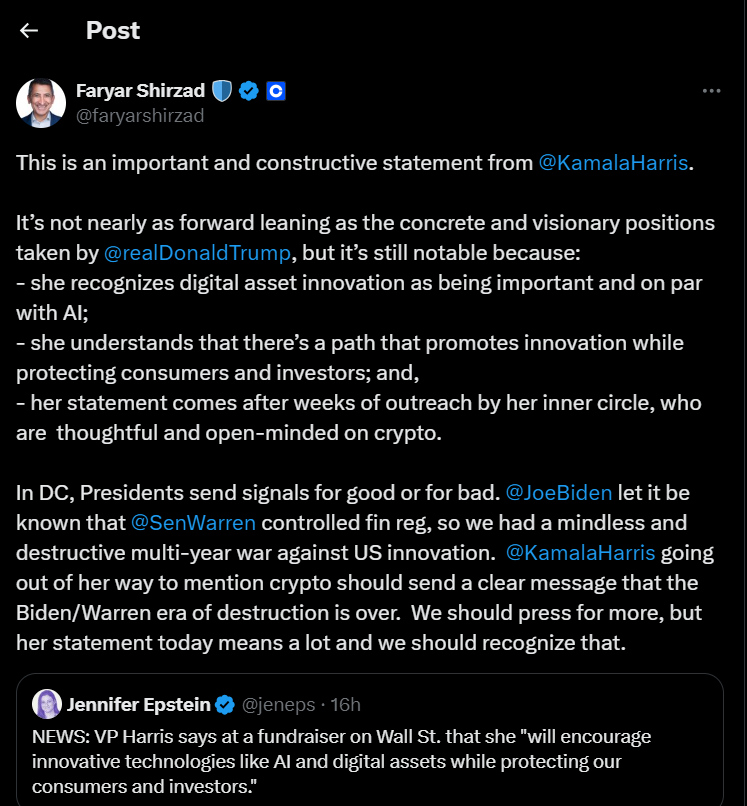
At a recent Wall Street fundraiser in Manhattan on September 22, Vice President Kamala Harris made a bold declaration about her vision for the future of technology in America. Addressing an engaged audience, she announced her commitment to advancing artificial intelligence (AI) and digital assets as integral components of her presidential campaign.
Kamala Harris declared, “We will encourage innovative technologies like AI and digital assets while protecting our consumers and investors,” outlining her ambition for a tech-driven economy that leverages cutting-edge innovations to create jobs, enhance productivity, and ensure that The United States remains a global leader in technological advancements.
Kamala Harris Vision for Innovation and Growth :
Harris’s plan includes significant investments in research and development initiatives focusing on AI, blockchain technology, and other digital innovations. Recognizing the transformative potential of these technologies, she emphasized the importance of establishing a regulatory framework that promotes responsible growth while safeguarding consumer interests and privacy.
By encouraging a collaboration between government, academia, and the private sector, Harris aims to create an ecosystem that supports startups and encourages established companies to innovate. This approach seeks to balance the need for innovation with the imperative of consumer protection, ensuring that advancements do not come at the cost of public trust or safety.
Kamala addressing Societal Challenges :
The Vice President Kamala Harris underscored the potential of AI and digital assets to address pressing societal challenges. She highlighted areas such as improving healthcare delivery, enhancing education through personalized learning experiences, and promoting financial inclusion.
Harris believes that by embracing these technologies, America can drive economic growth while ensuring that the benefits are shared equitably across all communities. For instance, AI could revolutionize healthcare by enabling more accurate diagnostics and treatment plans, while blockchain technology could facilitate secure financial transactions for underserved populations.
Kamala Harris Contrasting Stances in the 2024 Election :
As the 2024 election approaches, Harris’s focus on AI and digital assets reflects a broader trend among political leaders who recognize the transformative power of technology. However, her comments come at a moment for the cryptocurrency industry, which is keenly watching to see if she will adopt a different stance than President Joe Biden, who has been perceived as less favorable to crypto.
While some in the crypto space welcomed Harris’s remarks, others are calling for more detailed policies. Coinbase’s policy chief, Faryar Shirzad, described her comments as “important”

but noted they were less bold than those of her Republican competitor Donald Trump. Trump has actively promoted his support for crypto, launching NFT collections, entering into DeFi World Liberty Financial, recently introducing a Trump Coin and promising to fire SEC Chair Gary Gensler, that he is positioning himself as a champion for the industry. His pro-crypto stance has gained significant favor among crypto enthusiasts, while non-crypto voters tend to lean more favorably toward Harris’s more cautious approach to the digital assets.
Kamala Vs. Trump Polling Insights :
Current polling data indicates that Harris’s chances of winning the election stand at 52%, compared to Trump’s 47%, according to Polymarket data.

The next few months will be crucial for both candidates as they outline their visions for the future of technology and finance. Harris’s proactive stance on AI and digital assets positions her as a forward-thinking candidate ready to harness the potential of these technologies for societal betterment.
As the election campaign unfolds, Harris’s commitment to technological innovation and consumer protection may play a major role in shaping voter perceptions and influencing the outcome of the 2024 presidential race. Her emphasis on collaboration, transparency, and responsible growth could resonate with voters seeking a leader who prioritizes both innovation and public welfare.








